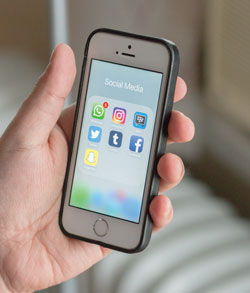Social media was created to allow people to get connected, but, ironically, people are becoming so distant from each other. Social media allows people to view the glamorous life of others from afar, but these glamorous posts only show what the person posting it wants viewers to see.
This causes a skewed perception of them, often making them see the one side of them that they portray on social media and not displaying the person who is posting’s actual character, their flaws or their misfortunes.
These images on social media convince people that those individuals are next to perfect based on seeing pictures of them appearing happy, wearing makeup, utilizing filters, and even looking insanely fit. When seeing these images, our minds often convince us that they are a superior being and that we are unworthy of knowing them. This causes people to be afraid to talk to them and just watch them from a distance because of their impending fear of being rejected by them.
This affects social interactions by causing people to be on their electronic devices, instead of being in the moment and actually talking to their peers. By engaging in these behaviors, it can lead to you feeling isolated, depressed, which could lead to low self-esteem. In time, it can trigger one to feel suicidal. These behaviors are linked together because when one feels isolated, they often have negative thoughts brewing in their mind leading to you to feel depressed, which makes them have a lower sense of self-esteem.
These problems can lead to a negative effect on your education. For example, students with this mentality will be too preoccupied with the online world to focus on their schoolwork, and if they are extremely distracted, they may perform poorly on exams.
Many adults have commented on how with many young people spending so much time online, they are losing the ability to develop and maintain connectedness with each other. Furthermore, they will not be able to efficiently communicate with their peers. The art of conversation is allegedly lost, and does not look like it will be resurfacing any time soon.
How many times have you been to the gym, and you see people plugged in to their iPhones either listening to music or posting/reading their Facebook timelines? Or you walk into a common area, and there are people on their laptops, not interacting with their peers, but plugged into their own private world?
I think it has made meeting people harder for our generation in real time, where people are spending more time acquiring 500 online friends, as opposed to 25 real friends that are empathic and loyal. Many people spend more time online than they do interacting with their friends and families in real time.
For those who need help getting out of this toxic social media addiction, here are some solutions: monitor your social media usage, try taking a social media hiatus, and even try deleting the apps.
Another solution that a Monmouth student can do is visit the counseling center in the student center on the third floor and receive emotional support to help break out of the negative social media environment.
Overall, to fully enjoy the college experience, one might want to strike a healthy balance between the virtual world and the real world.
IMAGE COURTESY of Yasir Talal G Alsaedi




